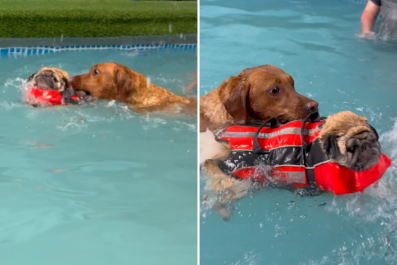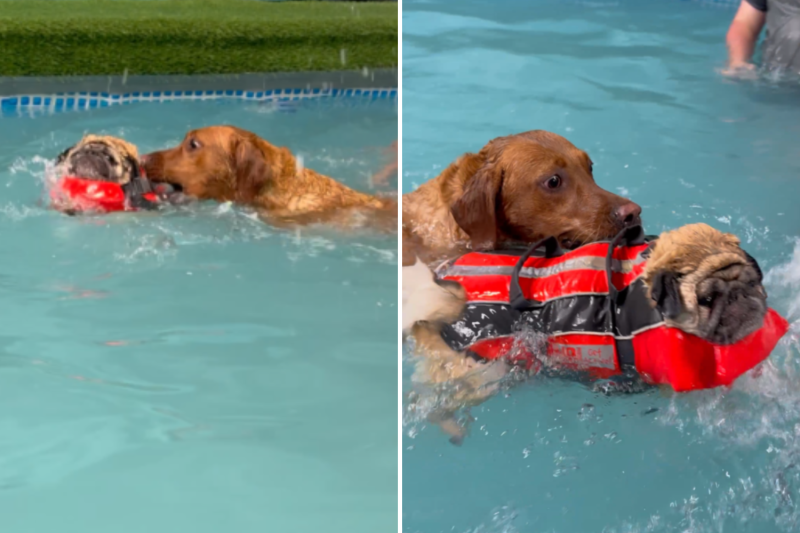
Labrador Thinks Pug in Life Jacket Is Drowning in Pool, Jumps Into Action
For humans, a day at the swimming pool is the perfect relaxation, especially on a summer's day, but, in the U.K., one company has been offering the same to canine companions.
Two visitors at the dog-friendly pool Doggie Dips were recently caught on camera as a Labrador retriever was captured "helping" her pug companion during a dip.
In the hilarious video, Ruby, clearly at ease in the water, watches as Luna—equipped with a life jacket—nervously wades into the pool. Sensing her friend's hesitation, Ruby swims up behind Luna, gently grabs hold of her life jacket, and tows her back toward the pool's edge.

Doggie Dips, located in Surrey, in the U.K., is a family-run business that provides a safe and fun environment for pups to learn to swim and enjoy the water. Stefan Penzes from the company told Newsweek: "Doggie Dips opened in November 2023, and it's been very well received by dog owners from the Ripley community and beyond. We offer an indoor heated swimming pool where dogs can have fun and owners can bond with their pets."
For canines, swimming is about more than just taking a relaxing dip. In 2016, researchers from Hartpury University in the U.K. discovered that hydrotherapy in the water helps to preserve joint health in dogs and prevent future issues.
"Dogs with elbow dysplasia displayed an increased range of motion, stride frequency and stride length, measures of mobility in our study, after the hydrotherapy," Dr. Alison Wills, who was part of the study, said.
"In this study, only Labradors were examined, but as other breeds are predisposed to developing elbow dysplasia, particularly German shepherds," Wills said, "it would be interesting to investigate how hydrotherapy affects the movement of different types of dogs."
Penzes said that swimming provides plenty of benefits for dogs, not only physically but also mentally. "Swimming is therapy, whether or not a dog has any health issues," he added.
As well as the benefits of swimming in general, Penzes said that swimming in a dedicated indoor pool could even be a great alternative to walkies. "People should consider swimming for their dogs in a safe clean environment more frequently, once or even twice a week for a 30-minute session, which is equivalent of a two-hour walk in the park," Penzes added.
He added that canines paddling in a clean environment is much safer than lakes or rivers where dogs have been known to fall ill and even die after swimming in contaminated waters. "Swimming in lakes and rivers comes with its own risks, with potentially harmful bacteria," Penzes said.
